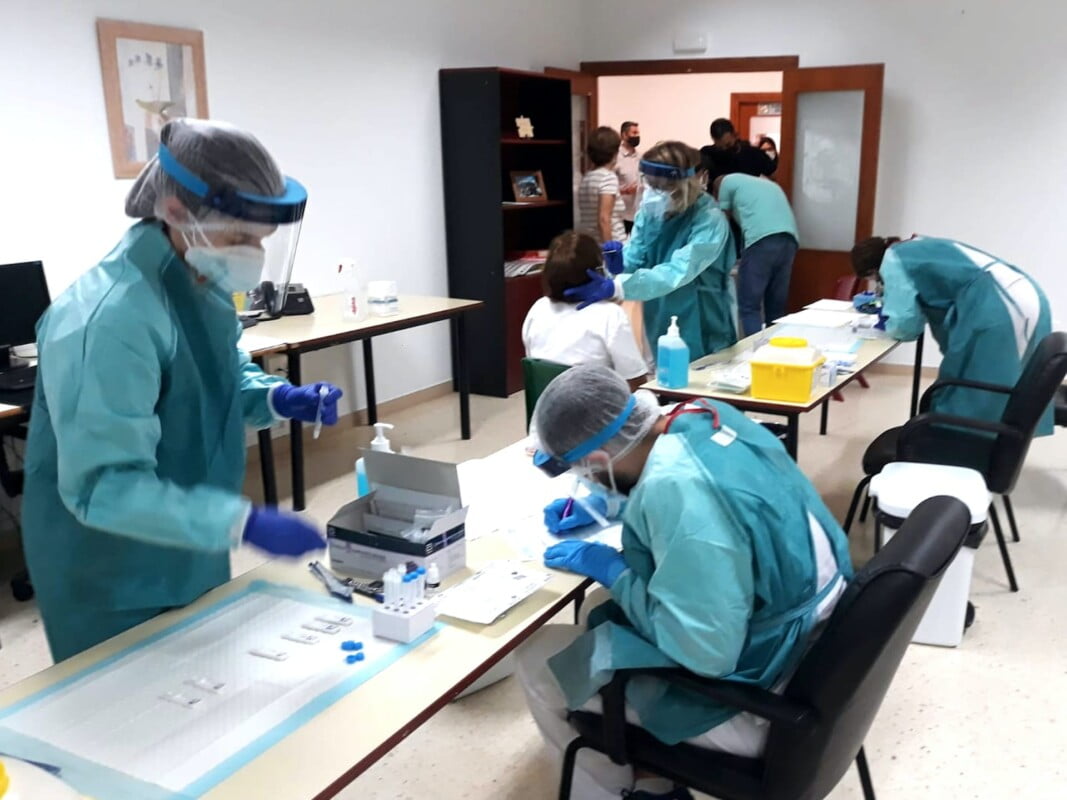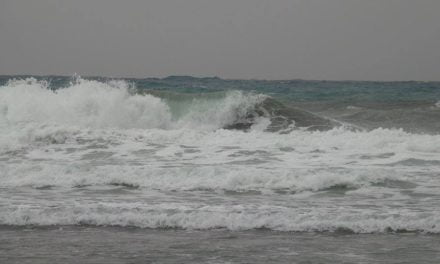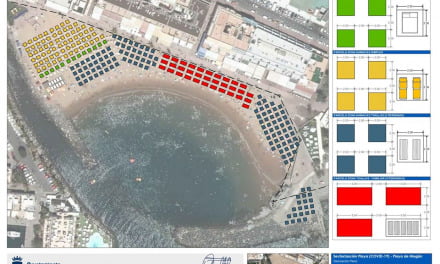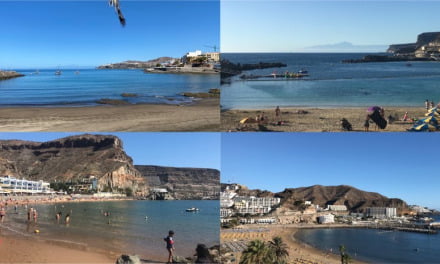The Canary Islands Government have now made clear that they will authorise the use of rapid antigen tests in the screening of tourists, news which will provide a boost and some much needed confidence, moving forward, for an industry which accounts for 40% of GDP in the archipelago, and which has been devastated this year due to the various measures employed in response to the COVID-19 pandemic. The Canary Islands Ministry of Health is preparing instructions to include this diagnostic technique, among the other options, for those visitors checking in to regulated tourist accommodation in the archipelago, detailing specifics for the required certificate to show negative results for a COVID-19 detection test before being allowed to stay in hotels, apartments or vacation homes on the Islands. Travellers who have not been able to acquire a test result within the 72 hours before arrival will be directed to local healthcare providers who can supply the test, costing an estimated €25-30 per person.
Health experts had questioned the validity and accuracy of the antigen test for tourists, that the Canary Islands Government have sought to implement over the coming week or so, following the General Directorate of Public Health’s publishing, on Monday last, of a resolution which did not advise the use of rapid antigen tests, except in cases either of patients who have presented symptoms within the previous five days or less, or else for suspected asymptomatic persons who have been identified as having had close contact with another confirmed positive case. It was made clear to journalists at Spanish language news portal CanariasAhora that, “with the current scientific evidence, the most suitable test” for the screening of tourists continues to be the PCR (Polymerase Chain Reaction).
Confusion arose within the tourism sector, as the Minister for Tourism had stated her preference for rapid antigen tests in the screening strategy for two fundamental reasons: They are faster; with results possible within just 15 minutes, compared to the 24 to 48 hours needed for PCR test results, during which time tourists could have had to remain isolated until given the all clear, and the rapid antigen tests are much cheaper, costing just €25-30 compared to the average €100-120 costs for a PCR test at private clinics and laboratories. The new Extraordinary Tourist Measures Decree law, approved last week by the Governing Council, is set to come into effect for all visitors arriving after November 14 2020, making this the first Spanish destination to require such certification. Similar tests are being trialled in the English city of Liverpool, where mass testing has now become available for anyone who wants it, regardless of whether they have displayed symptoms. It is hoped such tests will lead to a significant improvement in how citizens can go about their daily lives in the face of the continuing pandemic and measures used to try to contain it.
The Canary Islands Ministry of Health now say that national and international visitors to the Islands will not be considered as “individual cases”, for which the use of rapid antigen tests are governed by limitations stipulated in the Public Health Department resolution published last Monday, but instead as a “target group” with a specific screening strategy for asymptomatic patients, as occurs, for example, with workers and others within healthcare or other social health settings.
 The Carlos III Health Institute considers the possibility of using rapid antigen tests, although stipulate it may “be necessary to confirm positive cases by PCR, if the prevalence of the disease is low”. It is widely agreed that antigen tests may need to be supplemented with further testing, however their preliminary acceptance as an initial indicator for travellers is hoped to lead to greater confidence among visitors and tourism businesses as the travel market struggles in the face of repeated stoppages in various countries across Europe and the world.
The Carlos III Health Institute considers the possibility of using rapid antigen tests, although stipulate it may “be necessary to confirm positive cases by PCR, if the prevalence of the disease is low”. It is widely agreed that antigen tests may need to be supplemented with further testing, however their preliminary acceptance as an initial indicator for travellers is hoped to lead to greater confidence among visitors and tourism businesses as the travel market struggles in the face of repeated stoppages in various countries across Europe and the world.
Microbiology specialists have previously warned that rapid antigen tests may not be the most suitable for screening. “This test [antigen] does not detect the virus if there is not much viral load. It is not recommended for screening,” María Lecuona , president of the Canary Islands Society for Clinical Microbiology (SCMC), told Canarias Ahora a few days ago, explaining that this technique is not as sensitive or effective as PCR and that it is most useful during the first five days of symptoms.
Despite this, the Health Ministry has decided to authorize the rapid antigen tests for tourist screening through an order that will complement the decree law establishing the obligation to take a COVID diagnostic test before staying in tourist establishments, making a judgment call based on the tests being sufficiently effective, although perhaps not the most effective available. “The Canary Islands will use the most suitable tests in coordination with the Ministry of Health, dependant on cases and according to the indications set by the General Directorate of Public Health”, said the Ministry in a statement, which also leaves the door open to other diagnostic techniques that have sufficiently “satisfactory clinical performance for the health authority”.
Used in parallel with the various strategies for the early detection of COVID-19, the Health Ministry insists on the continued need to comply with measures aimed at containing its spread: the mandatory use of masks, interpersonal distances, hand hygiene, and capacity controls.
Rapid Antigen Tests Available on Gran Canaria
 The private-public partnership of the University Hospitales San Roque have been offering a range of coronavirus testing for some months now at their centres on Gran Canaria and Lanzarote, including the rapid antigen test at a base cost of just 25€ a time.
The private-public partnership of the University Hospitales San Roque have been offering a range of coronavirus testing for some months now at their centres on Gran Canaria and Lanzarote, including the rapid antigen test at a base cost of just 25€ a time.
If you are interested in taking the rapid antigen test contact them by calling 928 012 631 (Price € 25)
Schools can receive discounted testing by writing to: comunicacioncorporativa@hospitalessanroque.com (Price €15)
There are also discounts available for larger groups and for companies by writing to: direccion_medica_secretariaLP@hospitalessanroque.com (Price €20)
These tests are carried out at the Hospital de Vegueta and Maspalomas, as well as at Health Centers in Lanzarote and Vecindario . Check the conditions in the contacts indicated above. * The price for “schools” is for teachers who can demonstrate their current employment in a school and for students, so long as tests are organized by the school itself as a group. Otherwise, the price will be the normal cost for individuals.














Where would the tests be available to tourists that are staying in Tenerife South ???? Most clinics in the UK will be closed between 26/31 December so travelling on Jan 2nd 2021 will make it impossible to get a test 72 hours prior to travelling. Postal tests will not be reliable at this time either to guarantee the results getting back in time to travel ….. Very frustrating
I go on 26th December and having the exact same problem!
Are we able to get an antigen test in the UK in the 72 hours before flying out ? its cheaper and means we wont lose time when we arrive to Tenerife ?
Of course, though some have said they are still having trouble finding them, there will be more and more information available through tour operators, and as the Liverpool pilot scheme uses similar tests, it can be expected more places will offer the test over time.
So I’m from Liverpool and I get a weekly test, however I have been advised I cannot use this test as it doesn’t have my passport number on it, however it has NHS and all the other details required, seems stupid paying for a test when I’m getting weekly results from the NHS
I live in Liverpool so I’m having weekly tests, however I have been told that to travel to the canaries the result must have your passport number on so I will need to get a private test even though I’m having a weekly NHS one, seems stupid
Our lockdown ends 2 December and we due to fly out 5th don’t think if we did a test we wouldn’t get results iback in time is there a clinic in Porto del carmen lanzarote to get one please can I have some info
If your country is still high risk at that time you will need a PCR test result before you travel. If infections have been brought down to an acceptable level then you will just require the rapid antigen test which can be done once you arrive. There will certainly be local health centres on Lanzarote supplying the test, such as the Hospital San Roque centre in Arricefe (https://hospitalessanroque.com/en/centres/lanzarote-care-centre). The best thing to do is clarify with your tour operator or where you are staying, they will know the most local centres to you
Hi where is testing place in maspolanas please? Will it be busy?
There are several clinics offering the rapid antigen test. Hospital San Roque Maspalomas offers it for 25€ and a range of other tests also. You can contact them on the number at the bottom of this article: http://thecanarynews.com/2020/11/06/rapid-antigen-tests-to-be-authorised-by-canary-islands-for-visiting-tourists/
We planned to walk across Lanzarote and Fuerteventura in January, staying at a different place each night. How on earth can we do this with the Covid test required?
You should speak to each of the accommodations involved. In theory once you have entered Spain and so long as you have not been outside the canary islands since arrival, then your first test results should be acceptable in each of the accommodations, but always good to double check
We are due to fly on the morning of 26th December, arriving in Gran Canaria at 15.10 hours. (Subject to the flights being on time)
We are struggling to find a centre which has availability for the PCR test within 72 hours or arrival. There is also the worry that even if we do find a test centre the results may not be back in time. I understood that on the18th November the European Commission gave the green light for the use of the antigen fast tests for the control of borders, this being a recommendation which is not binding until all countries agree to accept such tests as valid, which I believe has not yet happened. Further I understand to date, there are no agreements between countries, and as such I thought it was still compulsory to have a PCR analysis negative in COVID-19 as opposed to the fast antigen test.
I am now very confused, do we need a PCR test or can we take an antigen test upon arrival at LPA airport? (We are travelling from Manchester in the UK)
If we are required to still obtain a PCR test but are unable to secure this in the UK, given the closure of the centres over the Christmas period, are we able to be tested once we arrive in Gran Canaria or will Jet2simply refuse to allow us to board?
Any clarification on this issue would be very much appreciated.
Hi… Sorry can you confirm an antigen test is acceptable when flying into Lanzarote?
HI, is it possible to get a test when we arrive in Tenerife South from Ireland at 11pm at night?
Spain should allow rapid test to anyone travel to Spain Not Just British people, since is really difficult to comply with the 72 hours in many countries someone explain us why BRITS heading for the Canary Islands from tomorrow won’t be required to take a full PCR test within 72 hours of travel, as required by the rest of Spain.
As of December 10, holidaymakers will be allowed in with a negative result from a rapid antigen test, which is a fraction of the price of the PCRs. https://www.thesun.co.uk/travel/13429823/canary-islands-tourists-covid-tests/